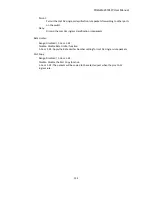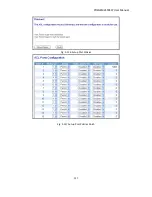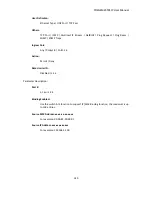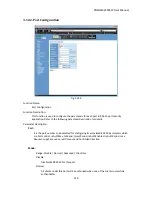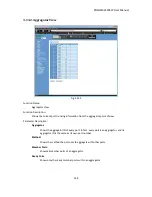
POEGEM24T4SFP
User
Manual
146
The
Fig.
3
‐
146
shows
the
procedure
of
802.1X
authentication.
There
are
steps
for
the
login
based
on
802.1X
port
access
control
management.
The
protocol
used
in
the
right
side
is
EAPOL
and
the
left
side
is
EAP.
1.
At
the
initial
stage,
the
supplicant
A
is
unauthenticated
and
a
port
on
the
switch
is
acting
as
an
authenticator
and
is
in
an
unauthorised
state.
So
access
is
blocked
at
this
stage.
2.
Initiating
a
session.
Either
authenticator
or
supplicant
can
initiate
the
message
exchange.
If
supplicant
initiates
the
process,
it
sends
EAPOL
‐
start
packet
to
the
authenticator
PAE
and
authenticator
will
immediately
respond
EAP
‐
Request/Identity
packet.
3.
The
authenticator
always
periodically
sends
EAP
‐
Request/Identity
to
the
supplicant
for
requesting
the
identity
it
wants
to
be
authenticated.
4.
If
the
authenticator
doesn’t
send
EAP
‐
Request/Identity,
the
supplicant
will
initiate
EAPOL
‐
Start
the
process
by
sending
to
the
authenticator.
5.
Next,
the
Supplicant
replies
an
EAP
‐
Response/Identity
to
the
authenticator.
The
authenticator
will
embed
the
user
ID
into
Radius
‐
Access
‐
Request
command
and
send
it
to
the
authentication
server
for
confirming
its
identity.
6.
After
receiving
the
Radius
‐
Access
‐
Request,
the
authentication
server
sends
Radius
‐
Access
‐
Challenge
to
the
supplicant
asking
them
to
input
their
username
and
password
via
the
authenticator
PAE.
7.
The
supplicant
will
convert
the
username
and
password
into
the
credential
information,
perhaps,
in
MD5
format
and
reply
with
an
EAP
‐
Response
with
this
credential
information
as
well
as
the
specified
authentication
algorithm
(MD5
or
OTP)
to
the
Authentication
server
via
the
authenticator
PAE.
As
per
the
value
of
the
type
field
in
message
PDU,
the
authentication
server
knows
which
algorithm
should
be
applied
to
authenticate
the
credential
information,
EAP
‐
MD5
(Message
Digest
5)
or
EAP
‐
OTP
(One
Time
Password)
or
other
algorithm.
Supplicant A
B
C
Authentication server
Authenticator
Fig.
3
‐
146
Summary of Contents for POEGEM24T4SFP
Page 68: ...POEGEM24T4SFP User Manual 68 Move to the previous page Next Page Move to the next page...
Page 82: ...POEGEM24T4SFP User Manual 82 Fig 3 42 Fig 3 43 Fig 3 44...
Page 89: ...POEGEM24T4SFP User Manual 89 Fig 3 48...
Page 106: ...POEGEM24T4SFP User Manual 106 Fig 3 71 Fig 3 72...
Page 108: ...POEGEM24T4SFP User Manual 108 Fig 3 75 Fig 3 76 Fig 3 77 ARP...
Page 109: ...POEGEM24T4SFP User Manual 109 Fig 3 78 ARP Fig 3 79 ARP Fig 3 80 ARP Fig 3 81 ARP...
Page 110: ...POEGEM24T4SFP User Manual 110 Fig 3 82 ARP Fig 3 83 ARP Fig 3 84 ARP Fig 3 85 ARP...
Page 111: ...POEGEM24T4SFP User Manual 111 Fig 3 86 ARP Fig 3 87 ARP Fig 3 88 ARP Fig 3 89 ARP Fig 3 90 ARP...
Page 112: ...POEGEM24T4SFP User Manual 112 Fig 3 91 IPv4 Fig 3 92 IPv4 Fig 3 93 IPv4...
Page 115: ...POEGEM24T4SFP User Manual 115 Fig 3 105 IPv4 Fig 3 106 IPv4 Fig 3 107 IPv4...
Page 116: ...POEGEM24T4SFP User Manual 116 Fig 3 108 IPv4 Fig 3 109 IPv4 Fig 3 110 IPv4...
Page 117: ...POEGEM24T4SFP User Manual 117 Fig 3 111 IPv4 Fig 3 112 IPv4 Fig 3 113 IPv4 Fig 3 114 IPv4...
Page 118: ...POEGEM24T4SFP User Manual 118 Fig 3 115 IPv4 Fig 3 116 IPv4 Fig 3 117 IPv4...
Page 119: ...POEGEM24T4SFP User Manual 119 Fig 3 118 IPv4 Fig 3 119 IPv4 Fig 3 120 IPv4...
Page 120: ...POEGEM24T4SFP User Manual 120 Fig 3 121 Action Fig 3 122 Rate Limiter...
Page 121: ...POEGEM24T4SFP User Manual 121 Fig 3 123 Port Copy Fig 3 124 DMAC Filter...
Page 211: ...POEGEM24T4SFP User Manual 211 Fig 4 3...
Page 238: ...POEGEM24T4SFP User Manual 238 2 1 3 1 4 1 5 1 POEGEM24T4SFP acl...

